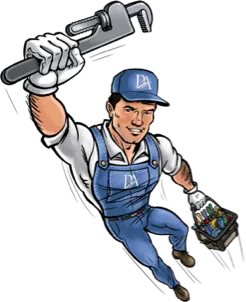Delivering Lasting Solutions to Your Most Challenging Plumbing Problems
What Actually Happens When You Use a Chemical Drain Cleaner
Serving Knoxville for 30+ Years
Knoxville homeowners have counted on The Plumbing Authority for over 30 years of honest answers, skilled workmanship, and customer-focused service.
Up-Front Pricing
From plumbing repairs to new installations and everything in between, we offer fair, upfront pricing you can trust with no hidden fees or surprises.
Fixed Right the First Time
Our licensed plumbers get the job done right the first time with accuracy, precision and care so you can get back to your day without the hassle.

When you’re facing a stubborn plumbing clog, your first impulse might be to reach for the bottle of chemical drain cleaner under your sink. After all, it seems like just another household cleaning product, right?
Not exactly. Below, we take a closer look at how chemical drain cleaners work, the risks they pose to your plumbing and personal safety, and why professional, chemical-free methods, like the Knoxville drain cleaning services we offer at The Plumbing Authority, are safer and more effective.
How Do Chemical Drain Cleaners Work?
Most shoppers don’t realize that there are two primary types of chemical drain cleaners:
1) Oxidizing Drain Cleaners
Oxidizing drain cleaners work by using nitrates to dissolve organic material in the clog while releasing intense gas and heat. This reaction helps break down grease and push the blockage loose.
2) Caustic Drain Cleaners
Caustic drain cleaners work a little differently. They rely on hydroxide ions and alkaline chemicals that combine to create extreme heat and transform the clog into a soapy, sudsy mixture.
Although both methods can break down organic matter, the reactions they create are powerful—and potentially dangerous.
Are Chemical Drain Cleaners Dangerous?
Unlike the spray that de-greases your stovetop or the liquid you use to clean your toilet, chemical drain cleaners create rapid, high-heat chemical reactions. Any substance capable of melting organic material or producing intense heat within seconds is not something you want to accidentally spill on your skin, face, or eyes.
Unfortunately, accidents still happen every year.
According to a retrospective review:
- Chemical drain cleaners cause an estimated 3,000 injuries annually in the United States
- One-third of those injuries involve cutaneous burns (skin damage caused by heat)
This is one reason many plumbers and safety experts recommend avoiding consumer-grade drain cleaners altogether.
Dangerous Ingredients in Chemical Drain Cleaners
Two ingredients in particular make chemical drain cleaners hazardous: concentrated sulfuric acid and sodium hydroxide.
Sulfuric Acid
Sulfuric acid is a highly corrosive liquid that can “char wood and most other organic matter on contact,” according to PubChem. It heats up dramatically when mixed with water, and contact with skin or eyes can cause severe, painful injuries.
Sodium Hydroxide
Sodium hydroxide—another corrosive substance—starts as a solid at room temperature but releases a large amount of heat when dissolved in water. Exposure can lead to eye, skin, and mucous membrane irritation, as well as more serious burns, hair loss, and long-term tissue damage.
Can Chemical Drain Cleaners Harm Plumbing Pipes?
Beyond personal safety risks, chemical drain cleaners can damage your home’s plumbing, especially when used repeatedly. Their caustic ingredients can wear down pipe materials over time—and the damage accelerates if the drain cleaner doesn’t actually clear the clog.
If the product fails to break through the blockage, you’re left with a clog plus a pool of hot, corrosive liquid sitting on top of it. That heat and chemical concentration can weaken your pipe walls, increase the risk of leaks, and shorten the lifespan of your plumbing system.
Chemical-Free Drain Cleaning Solutions
Professional drain cleaning methods are safer for your home, safer for you, and far more effective at removing stubborn or deep-seated clogs.
Drain Snaking (Cabling)
For smaller or occasional clogs, a plumber can use a drain snake to break through the blockage and restore flow. This method is straightforward, fast, and non-corrosive.
Hydrojetting
If your home is dealing with frequent clogs, sewer line buildup, or significant debris, hydrojetting offers a long-term solution. Using a commercial-grade machine, a plumber guides a hose through your drains to blast away buildup with high-powered water jets. This method clears the clog and washes away grime, grease, and residue inside your plumbing.
Frequently Asked Questions About Chemical Drain Cleaners
Get Help from Knoxville’s Drain Cleaning Pros
For reliable, chemical-free drain cleaning and exceptional customer service, you can always count on the Knoxville drain and sewer professionals at The Plumbing Authority. Whether you’re dealing with a stubborn clog, recurring issues, or suspect pipe damage, our team has the tools and expertise to help.
Schedule your appointment today by giving us a call!
Call (865) 245-5251
